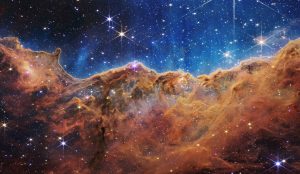Flying too close to the sun
Proceeding into space with caution will mitigate potential harms
August 28, 2022
The first images taken by the James Webb Telescope have recently returned to Earth on July 12 and quickly spread among an eager public. But before we let those swirling galaxies hypnotize us and those sparkling colors dazzle our eyes, we should first acknowledge the dangers of space exploration in order to protect against possible hazards.
With venturing into unknown territory comes the risk of polluting extraterrestrial ecosystems, and of accidentally carrying harmful substances back to Earth. The first scenario falls under forward contamination, or bringing microbes from Earth into space, and the latter constitutes backward contamination.
A report published by NASA in 2015 identified 25 knowledge gaps, or unanswered questions, regarding the handling and decontamination of samples retrieved from space. Scientists have not yet detected signs of extraterrestrial life, but as missions bring back more and more material taken from Mars, comets and asteroids, we should process these substances carefully to protect Earth from potentially hostile microbial life or foreign toxins.
On the flip side, what about the effect human actions may have on extraterrestrial life? The growth of private space flight brings the issue of regulating these missions so that they follow planetary protection (PP) procedures. For example, when tech entrepreneur and SpaceX CEO Elon Musk launched a Tesla roadster into space four years ago, scientists worried that the unsterilized car could potentially hit Mars in the distant future, contaminating it with bacteria from Earth and disrupting the planet’s ecosystem.
The question of overseeing the private sector increases in urgency as companies can more easily manufacture and launch small spacecraft; in line with this trend, Musk has stated a goal of sending people to Mars by 2024. While NASA conducts thorough sterilization of its spacecraft and has extensive knowledge on PP procedures, it does not have regulatory power to control licenses for commercial spaceflight and ensure that proper safety guidelines are being followed elsewhere.
In further considering the impact humans might have on extraterrestrial biospheres, we can also turn our attention towards Earth. We do not have a stellar record when it comes to preserving ecosystems and biodiversity, even on our own planet. According to a 2019 IPBES report, almost one million plant and animal species face the threat of extinction as a result of human activity such as logging, poaching and mining. While this by no means guarantees that we will affect space in the same manner, it reminds us that our desire for growth and progress can at times compromise our considerations for the life around us, a mistake we should not repeat when extending our presence to new worlds.
Space exploration can bring benefits such as new technology and a better understanding of the universe, but we should not let our excitement, or arrogance, blind us to the harm we could impose. If we conduct our exploration through an ethical lens and with a humble outlook, we can ensure that the benefits we gain truly advance humanity forward by promoting a respect and appreciation for our place in the universe.


















![“[Building nerf blasters] became this outlet of creativity for me that hasn't been matched by anything else. The process [of] making a build complete to your desire is such a painstakingly difficult process, but I've had to learn from [the skills needed from] soldering to proper painting. There's so many different options for everything, if you think about it, it exists. The best part is [that] if it doesn't exist, you can build it yourself," Ishaan Parate said.](https://harkeraquila.com/wp-content/uploads/2022/08/DSC_8149-900x604.jpg)




![“When I came into high school, I was ready to be a follower. But DECA was a game changer for me. It helped me overcome my fear of public speaking, and it's played such a major role in who I've become today. To be able to successfully lead a chapter of 150 students, an officer team and be one of the upperclassmen I once really admired is something I'm [really] proud of,” Anvitha Tummala ('21) said.](https://harkeraquila.com/wp-content/uploads/2021/07/Screen-Shot-2021-07-25-at-9.50.05-AM-900x594.png)







![“I think getting up in the morning and having a sense of purpose [is exciting]. I think without a certain amount of drive, life is kind of obsolete and mundane, and I think having that every single day is what makes each day unique and kind of makes life exciting,” Neymika Jain (12) said.](https://harkeraquila.com/wp-content/uploads/2017/06/Screen-Shot-2017-06-03-at-4.54.16-PM.png)








![“My slogan is ‘slow feet, don’t eat, and I’m hungry.’ You need to run fast to get where you are–you aren't going to get those championships if you aren't fast,” Angel Cervantes (12) said. “I want to do well in school on my tests and in track and win championships for my team. I live by that, [and] I can do that anywhere: in the classroom or on the field.”](https://harkeraquila.com/wp-content/uploads/2018/06/DSC5146-900x601.jpg)
![“[Volleyball has] taught me how to fall correctly, and another thing it taught is that you don’t have to be the best at something to be good at it. If you just hit the ball in a smart way, then it still scores points and you’re good at it. You could be a background player and still make a much bigger impact on the team than you would think,” Anya Gert (’20) said.](https://harkeraquila.com/wp-content/uploads/2020/06/AnnaGert_JinTuan_HoHPhotoEdited-600x900.jpeg)

![“I'm not nearly there yet, but [my confidence has] definitely been getting better since I was pretty shy and timid coming into Harker my freshman year. I know that there's a lot of people that are really confident in what they do, and I really admire them. Everyone's so driven and that has really pushed me to kind of try to find my own place in high school and be more confident,” Alyssa Huang (’20) said.](https://harkeraquila.com/wp-content/uploads/2020/06/AlyssaHuang_EmilyChen_HoHPhoto-900x749.jpeg)






